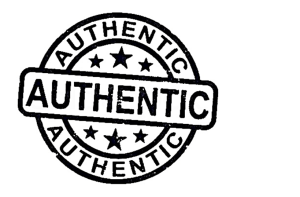Leaders,
 Are you genuinely expressing who you really are? Do you reveal your deepest values, convictions and aspirations in your interactions with others? On a scale of 1 – 10 (10 = constantly high on your radar), how much do you appreciate the goals of your organization and the needs of your colleagues and workforce?
Are you genuinely expressing who you really are? Do you reveal your deepest values, convictions and aspirations in your interactions with others? On a scale of 1 – 10 (10 = constantly high on your radar), how much do you appreciate the goals of your organization and the needs of your colleagues and workforce?
At its heart, authenticity is about practicing what you preach; being totally clear about who you are and what you do best. Being authentic means being honest and true to who you are, what you do and whom you serve, having a credibility in one’s words and behavior, and an absence of fakery. In an environment in which more human elements matter it creates value and benefits for your followers as well as improving your business.
Authenticity
I have no doubt that you have figured out who you are, what the raison d’être of your business is and what your world is. Some of you might not be as aware of it as others. That’s totally normal. Our identity may seem static, objective and given; yet, in truth it is fluid, subjective, and chosen. Let me explain why.
In the desire to be the architects of our own life striving for authenticity is essential for the discovery of the truth, and for finding fulfillment in life, making it more meaningful and comprehensible. Authenticity is the creative linkage of inner and outer conditions, for us to be able make an optimal contribution for ourselves and for others.
Authenticity is both, personal and social. Becoming authentic is an individual mission, since everyone has their own way of being human, and consequently what is authentic will be different for each person. Authenticity is very much contextual, and depends on various social, cultural, and environmental characteristics. Becoming authentic is a continuous process, not an event. It involves not just knowing oneself, but also recognizing others and the mutual influence between individuals.
Discovering who you are in the moment modifies your already established identity. In every moment we can rediscover and recreate ourselves. This change takes place when we discover that who we are in the moment is not congruent with how we have identified ourselves. In general, a state of inauthenticity can be a source of profound dissonance, prompting people to try to become more authentic, in harmony in their inner and outer lives. We then have the opportunity to redefine ourselves in order to align with what is most true in the present. This is an ongoing process because our authentic identity changes throughout our life in response to the impact of our life experiences. The dance for all of us is our engagement with who we thought we were and the discovery of who we are now in the moment. This will allow us to modify our old identity to a more authentic identity. This dance is a life-long process.
Like identity, authenticity cannot be adequately defined or measured, since many characteristics of an individual are in constant change, with no fixed reference points. Individuals undergo changes throughout life with a flash flood of observations and interpretations, so human identity is multidimensional and dynamic; it is a work in progress rather than a fixed state.
What are your thoughts and experiences? Can you relate to the dynamic nature of authenticity? Is it true or false from your view point? Please leave a comment below. Thank you.
Authenticity speaks volumes. Tell a genuine, honest story about yourself and your business that resonates with people. Coaching with Inspired Executives brings into view the linkages and tensions between personal and social authenticity to support leaders in finding their most creative and vital response to their leadership challenges. Contact me.
Carpe Diem! Annette.
PS: On this website you can read another article on ‘authenticity’ that predominantly focuses on authentic leadership.
PPS: I highly recommend the following books on authenticity:
